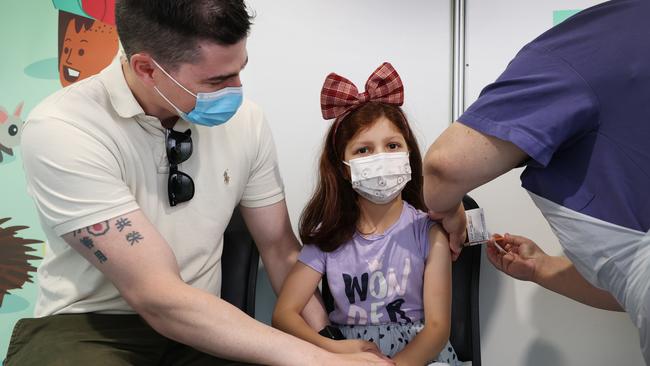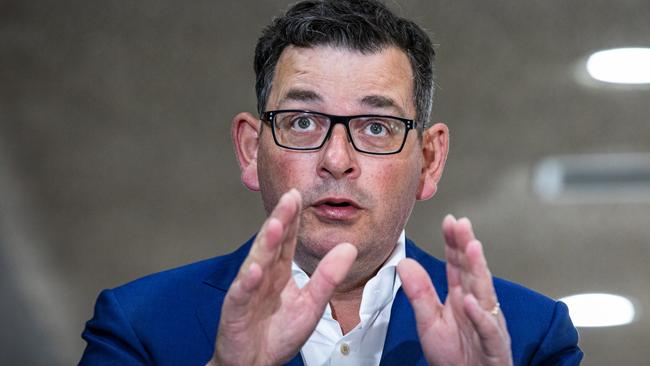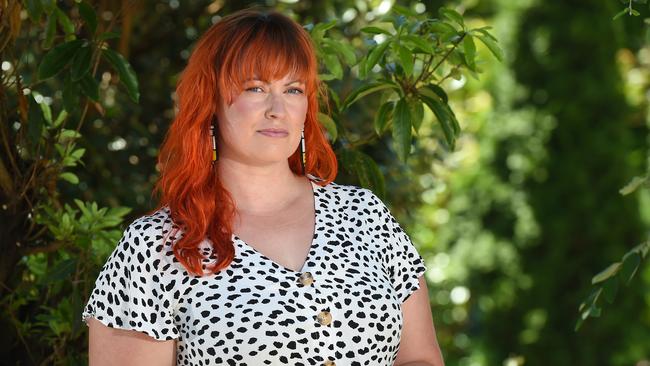Covid booster vaccine roll-out suffering sluggish start
Victoria has recorded 40,127 new cases and 21 deaths, as the government calls on retired and student healthcare workers to boost the state’s vaccination program.
Coronavirus
Don't miss out on the headlines from Coronavirus. Followed categories will be added to My News.
This coronavirus article is unlocked and free to read in the interest of community health and safety. Click here for our latest great value offer and instantly access trusted news from the Herald Sun and Leader.
Victoria’s state government has pledged to recruit more than 1000 retired and student healthcare workers in a bid to boost the state’s vaccination program.
Victoria’s program is recording a sluggish start to 2022, vaccinating less than half of their capacity in their first week of the year.
Deputy Premier James Merlino said the scheme would remove some of the “extreme demand” currently on the healthcare system.
“We’re calling on first year health students, retired nurses and more to join an expanded workforce of Covid-19 vaccinators,” he told reporters on Tuesday.
“We’ll be targeting up to 1000 Victorians to come on-board.
“People with appropriate knowledge and experience and that you be could – applications open next week.
“Of course they’ll only be operating in well established public health run sites which have a very strong process in place to ensure this new cohort of workers are trained, supervised and supported.”
It comes as 40,127 new cases and 21 deaths were reported in Victoria on Wednesday.
The number of active cases has swelled to 209,715. There are 946 people in hospital as a result of the virus, including 112 in intensive care and 31 on ventilators.
Victoria’s slow start to the booster roll out comes as the government moves to open 30 new pop-up clinics in primary schools to boost jabs for children aged five to 11.
New figures show that from January 4 to 10, when state vaccination hubs reopened for the new year, government clinics delivered 125,111 doses.
But at the start of 2022, the Andrews Government announced a third dose blitz that was expected to see 300,000 weekly jabs administered alongside 600,000 from GPs and pharmacists.
The results from the first week are 41 per cent of this target.
Opposition health spokeswoman Georgie Crozier said the booster blitz had stumbled out the door, with IT issues also initially delaying bookings for kids jabs.
“Victorians deserve a government focused on getting us out of this mess, not one obsessed with its own PR,” she said.
“We need real solutions to get Victorians their boosters so we can recover, rebuild and move on with our lives.”

Ms Crozier said the state Opposition were calling for a 24-hour vaccine hub to provide more flexibility and to redirect government advertising on major projects into a booster campaign.
They also urged for more pop-up clinics and mobile sites in local suburbs and popular summer holiday destinations.
At his first press conference for the year, Premier Daniel Andrews said roughly half those who were eligible for a booster in the state had received one.
“We have to do better than that, in coming weeks,” he said.
“I know it is the holiday period, perhaps, getting your third dose is the last thing on people’s minds as they celebrate and spend quality time with family and friends.
“But now as we are getting into January, we need to focus on getting everyone who is eligible to be boosted, or to get a third dose.”
When asked if there were any new restrictions he would rule out as Victoria battles surging Omicron cases, Mr Andrews said “The only one talking about lockdowns is you”.

“I don’t know what variant is coming in a month or in six months.
“So I can never give you an absolute answer to these things but we’re going to do everything we possibly can to have as few rules as possible.
“That’s what living with this or normalising this, pushing beyond it is all is all about.”
Pop-up vaccination clinics will be rolled out at 30 primary schools across Victoria in an effort to ramp up jabs for children aged five to 11.
Mr Andrews said 39,000 bookings for vaccinations in this age group had been made so far and more than 40,000 were currently available.
The state will put $4 million in grants to help GPs and community pharmacists to set up “mini” vaccination clinics in places where they are most needed.
These clinics will be at schools in areas that need higher vaccination levels, delivering jabs to students in locations they know well outside of school hours.
IVF TREATMENT DELAY ‘TERRIFYING’
Would-be mums face the possibility of not having children after IVF treatments were cancelled to divert health resources to Covid-19.
They include Irene Scott, 38, who has been trying to have a child for many years.
“It adds an extra level of stress, which is not ideal because we’re constantly told as women that stress affects fertility as well,” she said.
Rules around IVF were further tightened on Monday so that only women who have begun the procedure or are receiving other health treatment that would render their eggs non-viable can go ahead.
It removed a caveat introduced on Friday, when it was announced elective surgeries and procedures would be delayed to focus on Covid-19. Following years of trying to conceive naturally with partner David, Ms Scott decided to begin IVF before Melbourne’s sixth lockdown.

She pre-emptively put herself in a “quasi lockdown” to make sure she didn’t contract the virus before her treatment, which was due to start in a few weeks. Ms Scott described the further delay as “terrifying”.
“I work in a project that works around Covid-19 ... so I understand the pressures and challenges they’re going through,” she said.
“But I think when it comes to IVF, it really can’t be viewed as something that is an elective surgery or procedure, especially for women of an older age. This is my last option; the older you get, the harder it gets.”
Ms Scott said the delay caused by her treatment being cancelled could be the difference between having a child or not.
“For us, we’re at the stage of trying to extract some embryos we can then implant, and we’re well aware that getting those embryos is one stage of a very long process,” she said.
An online petition calling for fertility treatment to be reinstated has already attracted 1800 signatures.
Number One Fertility managing director Lynn Burmeister said her clinic had received “literally hundreds of calls from patients nervous and scared about their upcoming IVF cycles”.
“They are not doing IVF because they have a choice, they are doing it because they have exhausted all other options,” Dr Burmeister said.
Health Minister Martin Foley was asked for comment.


